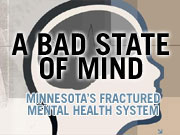|
Audio
Photos
Respond to this story
|
A needless suffering
February 9, 2004
 |
| "Alayna," wrote a report for school after being hospitalized during a psychotic rage. Her mother was surprised when she uncovered Alayna's self-portrait. (MPR Photo/Lorna Benson) |
St. Paul, Minn. — Sue Mitchell saves things, especially her children's things. Like many parents she keeps old playbills, awards and artwork. Her collections are full of happy moments. The bad memories also have a place. Mitchell's daughter, Alayna, wrote a report for school after being hospitalized during a psychotic rage. Mitchell knowingly flips through the pages but is surprised when she uncovers Alayna's self-portrait.
"Wow. It's like if my brain felt like that looks, it would be horrible. It's messy and confusing and dark colors and blotches of red that looks like blood and I don't know," she says.
Mitchell knew something was seriously wrong with her 15-year-old daughter long before she rushed her to the hospital. More than six months earlier, Alayna's new pediatrician switched her depression medicine. Alayna had an unexpected reaction. Suddenly she was irrational and aggressive and the pediatrician couldn't stop her rapid mental decline.
Alayna doesn't like talking about that time in her life but she admits she was a different person.
"I hated to be at home. I hated it and there was a lot of fighting whenever I was home," she says.
A THREE MONTH WAIT
Her pediatrician recommended a child psychiatrist. Mitchell immediately called for an appointment and was stunned to hear she would have to wait three months. So she called all of the other child psychiatrists in the Twin Cities and none of them had an opening any sooner.
"I remember sitting home one day thinking, 'I have to go out of state. I have to start calling Wisconsin and Iowa.' I called Rochester, actually. I got the name of a physician associated with the Mayo Clinic. He had a two-year wait."
|
We see kids who had clear symptoms of depression or anxiety that lead to them failing school and ruining relationships and feeling like a failure and if they had been seen six months ago, they wouldn't have gotten so disabled...
- Dr. Eric Larson |
Out of options and ideas, Mitchell and her daughter waited. But Alayna's illness didn't. One night after watching movies at a friend's house, she called her mother to get a ride home. When she picked her daughter up, Mitchell made a comment about the neighborhood. Alayna accused her of being judgmental.
"She was hyperventilating. She was screaming at me so loud. I started getting afraid. I'm driving. She undid her seat belt. We crossed University Avenue and she said, 'I'm getting out. I'm gonna jump out right now,' and the car was moving. I tried to pull over quick. I tried to hold her (and) steer over to the curb. She was crazy. She was like a monster."
The episode didn't end there. It lasted most of the night. When they finally got home, Alayna was exhausted but still screaming. Her mother suggested she take a hot shower to calm down.
"She got out of the shower. She was wrapped in a towel and standing in the hallway and kind of slid down the hallway wall in a heap on the floor and was saying, 'Mom, what's wrong with me?' Oh God. And at that point we didn't know."
Mitchell rushed her daughter to the hospital.
"I wanted that to be my last resort. I was so mad that I would have to actually let her disintegrate so much to have to be admitted to a hospital just to get an appointment," she says.
Alayna got her diagnosis -- bipolar disorder. She was given medicine and four days later she went home.
KIDS ARE PAYING THE PRICE OF A FAILED SYSTEM
Her case is not unusual. Every day children with psychiatric disorders are forced to wait for care while kids with colds and earaches get immediate medical attention.
"We see kids who had clear symptoms of depression or anxiety that lead to them failing school and ruining relationships and feeling like a failure and if they had been seen six months ago, they wouldn't have gotten so disabled that they needed to be hospitalized. That's just almost an every-day event," says psychiatrist Eric Larson, who calls it "an unnecessary crisis."
Larson says the situation won't improve until some basic changes are made in the health care system.
 | |||
"To me it is obvious why there is a shortage of practitioners. It's much more work and there's no more pay," he says.
Child psychiatry is an unappealing specialty to many medical students, because it takes an extra year or two of expensive training, and health plans don't pay them any more for their expertise than adult psychiatrists. It also takes more time to treat children, so child psychiatrists have fewer patients to bill.
INSURANCE COMPANIES OFFERING LITTLE HELP
Minnesota's large health plans have been talking about the psychiatry pay problem, but so far they haven't done anything to fix it.
Jon Scanlon, with Blue Cross Blue Shield, says insurers are cautious.
"It's a very competitive business now selling health insurance. If Insurance Company A pays for a service that Insurance Company B doesn't pay for, Company B may be able to sell their insurance cheaper. And right now people are looking at costs very closely," he says.
But Scanlon says even if child psychiatrists made more money, the shortage wouldn't go away.
 | |||
"If there was an increase of 10, or 20, or 30 percent, it isn't going to attract a medical student with a $120,000 debt graduating from medical school to go into child psychiatry," he says.
Compared to other medical specialties, psychiatry is at or near the bottom of the pay scale. On average a psychiatrist might bill $350,000 a year before expenses, while a cardiologist bills up to $1.5 million.
Health plans say that disparity reflects what employers value and are willing to pay for. That means there's less money devoted to the people and places who do mental health work.
SORRY, NO BEDS
Curt White experienced that first-hand when he took his hysterical, mentally ill son, Connor, to the emergency room one night. It took three adults to hold the tiny 7-year-old down while the doctor sedated him. But the hospital told White that Connor couldn't stay.
"Couldn't find a bed. Couldn't find a bed. Couldn't find a bed nowhere. We checked North Dakota, South Dakota and Iowa they said. And I'm like, 'You're kidding?'" says White.
White says he thought it was a fluke until later that year when he took his son to a different hospital. They told him they didn't have the facilities to help him either.
"Well then why in the hell did I drive 20-some miles for you to tell me that? And he says, 'Well why did you come here?' And I said, 'Because this is where I was told to bring him.'"
Many Minnesota hospitals have closed their mental health units in recent years because they lose money on them and typically, hospitals can't find psychiatrists to staff them anyway.
State law requires hospitals to find a bed for patients who are suicidal or threatening. Often times young children don't appear to meet this high standard, allowing some hospitals a way of getting around the bed shortage.
Connor is now 9-years-old, and his problems have gotten more serious. He has been diagnosed with Attention Deficit and Hyperactivity Disorder, Tourettes Syndrome, which is associated with inappropriate comments, and Asberger's Syndrome, which is a form of autism.
Still, Connor's diagnoses don't get him off the hook. He's been in trouble for threatening classmates and recently after a tough day at school, he talked openly while playing his video game about his desire to hurt people.
"That's what I feel like doing to a lot of people I don't like," he said.
Two dinosaurs on Connor's video screen explode.
"Killing 'em. Choking 'em to death. Choking 'em to death. I just feel like choking 'em to death." Curt White says Connor doesn't mean what he's saying. It's part of his illness. But to the rest of the world, it doesn't matter; that worries White.
"If he doesn't get the help or doesn't learn how to control these impulses, he's going to pay for it later and I don't think that's fair," White says.
There are some efforts underway to fix the shortage of child and adolescent psychiatrist. (Learn more)
|
News Headlines
|
Related Subjects
|

